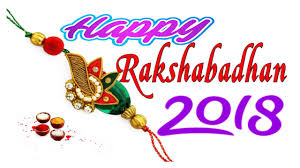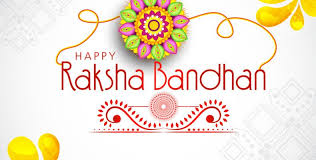Raksha Bandhan 2018
Raksha Bandhan 2018 is celebrated on Saturday, the 25th of August(25/8/2018).
Raksha Bandhan2018 is celebrated in Shravana month during full moon day or Purnima day.
Raksha Bandhan, additionally Rakshabandhan, or basically Rakhi, is a yearly ceremony performed in the Indian subcontinent, or by individuals starting from the Indian subcontinent, and based on the tying of a string, charm, or talisman on the wrist as a type of custom security. The assurance is offered mainly by sisters to siblings, yet in addition by clerics to supporters, and here and there by people to genuine or potential sponsors. Contrasting variants of the ceremony have been generally performed by Hindus in northern India, western India, Nepal,and previous provinces of the British Empire to which Hindus had emigrated from India in the nineteenth century, and have included, also, ceremonies with names rendered as Saluno, Silono, and Rakri. The customs related with these rituals, be that as it may, have spread past their conventional areas and have been changed through innovation and migration, the movies, social interaction, and advancement by politicized Hinduism, and in addition by the country state.
Raksha Bandhan is seen on the most recent day of the Hindu lunar schedule month of Shraavana, which commonly falls in August. On this day, sisters of any age tie a charm, or talisman, called the rakhi, around the wrists of their siblings, ceremonially ensuring their siblings, getting a blessing from them consequently, and customarily contributing the siblings with an offer of the duty of their potential care. The articulation "Raksha Bandhan," Sanskrit, truly, "the obligation of insurance, commitment, or care," is currently primarily connected to this custom. It has likewise connected to a comparable custom in which a residential minister ties talismans, charms, or strings on the wrists of his benefactors and gets endowments of money. A custom related with Saluno incorporates the sisters putting shoots of grain behind the ears of their brothers.
Of extraordinary criticalness to wedded ladies, Raksha Bandhan is established in the act of regional exogamy, in which a lady of the hour weds out of her natal town or town, and her folks, by custom, don't visit her in her wedded home. In rustic north India, where regional exogamy is emphatically pervasive, substantial quantities of wedded Hindu ladies head out back to their folks' homes each year for the ceremony. Their siblings, who normally live with the guardians or adjacent, in some cases travel to their sisters' hitched home to escort them back. Numerous more youthful wedded ladies arrive fourteen days sooner at their natal homes and remain until the ceremony. The siblings fill in as long lasting middle people between their sisters' hitched and parental homes, and also potential stewards of their security. In urban India, where families are progressively atomic, and relational unions not generally customary, the celebration has turned out to be more emblematic, however keeps on being exceptionally prominent.
Among ladies and men who are not blood relatives, there is likewise a changed custom of deliberate family relations, accomplished through the tying of rakhi ornaments, which have played hooky lines,[ and Hindu and Muslim divisions. In a few networks or settings, different figures, for example, a matron, or a man in expert, can be incorporated into the function in custom affirmation of their benefaction.[ Raksha Bandhan is additionally celebrated by Hindu people group in different parts of the world. Although established in Hindu culture, the celebration has no conventional petitions unambiguously connected with it. The religious fantasies asserted for it are questioned, and the recorded stories related with it considered spurious by some historians. More as of late, after establishment of more sexually impartial legacy laws in India, it has been proposed that in a few networks the celebration has seen a resurgence of festivity, which is serving to in a roundabout way weight ladies to refuse completely guaranteeing their inheritance.
Raksha Bandhan 2018
As indicated by R. S. McGregor's Oxford Hindi-English Dictionary, 1993, the name of the celebration, the manly Hindi thing rakśābandhan is made out of the Sanskrit loanword rakśā, a female thing, which signifies, "insurance," "protection," or "mind." and a second Sanskrit loanword bandhan, a manly thing, which signifies "affixing," or "binds together."[34] According to V. S. Apte's Revised Practical Sanskrit-English Dictionary, 1957– 1959, रक्षा articulated rakṣā signifies, "insurance," "protection," or "guarding;" बन्धन articulated, "bandhana," signifies "The demonstration of authoritative, securing, tying."
As per McGregor, the Hindi female thing, rākhī, (which is contrasted etymologically with rakśā depicted above) is a "defensive charm: a bit of string and so forth., with a rosette, tied ceremoniously cycle a defender or benefactor's wrist on the full moon of the month Srāvan: particularly by a sister cycle a sibling's wrist, when the sibling gives a little endowment of money."[37] interestingly, Apte characterizes one of the auxiliary significance of रक्षा (rakṣā) to be: "A bit of silk or string secured round the wrist on specific events, particularly on the full-moon day of Śrāvaṇa, as a talisman or additive; (रक्षी (rakṣī) additionally in this sense).
As per Jack Goody, rakśābandhan is "related with the Sanskrit name for marriage, saṃbandhan, where the normal component bandhan (Sanskrit: bandhá) alludes to the demonstration of tying. The functions are correlative. Marriage (sam, correspondingly) ties life partners; rakśābandhan ties sibling and sister."[38]
Raksha Bandhan 2018
Researchers who have expounded on the custom, have normally depicted the conventional district of its recognition as north India; in any case, likewise included are: focal India, western India and Nepal, also different locales of India, and abroad Hindu people group, for example, in Fiji. Anthropologist Jack Goody, whose field examine was directed in Nandol, in Gujarat, portrays Rakshabandhan as a "yearly service ... of northern and western India."[39] Anthropologist Michael Jackson, states, "While customary North Indian families don't have a Father's or Mother's Day, or even what might as well be called Valentine's Day, there is a Sister's Day, called Raksha Bandhan, ..."[40] Religious researcher J. Gordon Melton portrays it as "basically a North Indian festival."[41] Leona M. Anderson and Pamela D. Youthful depict it as "a standout amongst the most prominent celebrations of North India."[42] Anthropologist David G. Mandelbaum has portrayed it as "a yearly custom saw in northern and western India."[43] Other portrayals of essential districts are of advancement business analyst Bina Agarwal ("In Northern India and Nepal this is ritualized in celebrations, for example, raksha-bandhan."), researcher and dissident Ruth Vanita ("a celebration broadly celebrated in north India."), anthropologist James D. Faubion ("In north India this sibling sister relationship is formalized in the service of 'Rakshabandhan.'"), and social researcher Prem Chowdhry ("... in the perceptible restoration of the Raksha Bandhan celebration and the recharged holiness is has guaranteed in North India.").
Raksha Bandhan 2018
Anthropologist McKim Marriott in his "Little Communities in an Indigenous Civilization," (1955) portrays a "vast" convention of Rakhi-bandhan, or Raksha-bandhan, in which a minister ties charms around their benefactors' wrists and gets endowments of cash, and a neighborhood custom of Saluno in Aligarh area of North India in which sisters put ears of holy grains on the heads and behind the ears of their sibling in assertion of the sibling's part as their genuine or potential protector.Marriott's work likewise depicts the field investigation of anthropologist Alan R. Beals in Namhalli, a town close Bangalore, who notes changes in the rakhi custom expedited by current technology.
While Raksha Bandhan is commended in different parts of the Indian subcontinent, diverse districts check the day in various ways.
In the province of West Bengal and Odisha, this day is additionally called Jhulan Purnima. Petitions and puja of Lord Krishna and Radha are performed there. Sisters attach rakhi to siblings and wish everlasting status. Political gatherings, workplaces, companions, schools to universities, road to royal residence praise this day with another desire for a decent relationship.[citation needed]
In Maharashtra, the celebration of Raksha Bandhan is praised alongside Narali Poornima (coconut day celebration). Kolis are the anglers network of the waterfront state. The anglers offer petitions to Lord Varuna, the Hindu divine force of Sea, to summon his endowments. As a major aspect of the customs, coconuts were tossed into the ocean as contributions to Lord Varuna. The young ladies and ladies tie rakhi on their sibling's wrist, as elsewhere.
In the locales of North India, for the most part Jammu, it is a typical practice to fly kites on the adjacent events of Janamashtami and Raksha Bandhan. It's not irregular to see the sky loaded with kites of every kind imaginable, nearby these two dates. Local people purchase kilometers of solid kite string, generally called as "gattu entryway" in the nearby dialect, alongside a large number of kites.[citation needed]
In Haryana, notwithstanding observing Raksha Bandhan, individuals watch the celebration of Salono. Salono is praised by ministers seriously tying talismans against fiendish on individuals' wrists. As somewhere else, sisters tie strings on siblings with petitions for their prosperity, and the siblings give her blessings promising to defend her.
In Nepal, Raksha Bandhan is alluded to as Janai Purnima or Rishitarpani, and includes a holy string service. It is seen by the two Hindus and Buddhists of Nepal. The Hindu men change the string they wear around their chests (janai), while in a few sections of Nepal young ladies and ladies tie rakhi on their sibling's wrists. The Raksha Bandhan-like sibling sister celebration is seen by different Hindus of Nepal amid one of the times of the Tihar (or Diwali) festival.
The celebration is seen by the Shaiva Hindus, and is prominently referred to in Newar people group as Gunhu Punhi.
Raksha Bandhan 2018
Rabindranath Tagore, the Indian Nobel Laureate for writing, summoned Raksha Bandhan and rakhi as ideas to rouse love, regard and a promise of shared security amongst Hindus and Muslims amid India's frontier era. In 1905, the British domain separated Bengal, a region of British India based on religion. Rabindra Nath Tagore orchestrated a service to observe Raksha Bandhan to fortify the power of profound devotion and harmony amongst Hindus and Muslims of Bengal, and urge them to together challenge the British realm. He utilized the possibility of Raksha Bandhan to spread the sentiment of fellowship. In 1911, British pioneer realm turned around the parcel and bound together Bengal, a unification that was restricted by Muslims of Bengal. At last, Tagore's Raksha Bandhan-based interests were unsuccessful. Bengal not exclusively was part amid the frontier period, one section wound up present day Bangladesh and prevalently Muslim nation, the other a to a great extent Hindu Indian province of West Bengal. Rabindranath Tagore began Rakhi Mahotsavas as an image of Bengal solidarity, and as a bigger network celebration of harmony. In parts of West Bengal, his custom proceeds as individuals attach rakhis to their neighbors and dear friends.
One of Tagore's lyric conjuring rakhi is
Raksha Bandhan 2018
 Reviewed by My Bloge
on
3:05 AM
Rating:
Reviewed by My Bloge
on
3:05 AM
Rating:
 Reviewed by My Bloge
on
3:05 AM
Rating:
Reviewed by My Bloge
on
3:05 AM
Rating:





No comments: